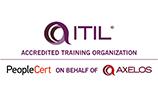Course Outline
Key Concepts of IT Service Management
• Customer.
• User.
• Sponsor.
• Service management.
• Service.
• Utility.
• Warranty.
Create Value with Services
• Organization,
• Outcome,
• Output,
• Risk,
• Cost,
• Value,
• Utility and Warranty.
Service Relationships Concepts
• Relationship management/Service offering/Consumption/Provision.
How ITIL Guiding Principles Help Organizations Adopt/Adapt Service Management
• The essence, application, and dynamics of the guiding principles.
• Emphasizing on value.
• Commencing from your current position.
• Advancing incrementally through feedback.
• Cooperating and enhancing transparency.
• Considering/Operating holistically.
• Maintaining simplicity/pragmatism.
• Enhancing and streamlining through automation.
Understand & Describe 4 Dimensions of Service Management
• Value streams and processes.
• Information and technology.
• Organizations and people.
• Partners and suppliers.
The Purpose/Components of the ITIL Service Value System
• Clarifying the ITIL service value system.
• Unveiling the activities within the service value chain and their interconnections.
• Highlighting the interconnectedness of the service value chain and its facilitation of value streams.
The Inputs/Outputs/Purpose of Every Value Chain Activity
• Engaging/Improving/Planning.
• Designing and transitioning.
• Building and obtaining.
• Supporting and delivering.
The Purpose of ITIL Practices
• Information security management.
• Capacity/Performance management.
• Relationship/Supplier/Availability management.
• Service continuity management.
• Monitoring/Event management.
• Incident/Problem management.
• Service Desk/Service Level management.
• Release management.
• Deployment management.
• Service configuration management.
• Service request management.
• IT asset management.
• Continual improvement.
Define ITIL Terms
• IT asset.
• Availability.
• Configuration item.
• Incident/Problem.
• Known error.
• Change.
• Event.
• 7 ITIL practices.
Explain ITIL Practices in Detail & How They Fit Within the Service Value Chain
• Change control.
• Service request management.
• Incident/Problem management.
• Service Desk/Service Level management.
• The continual improvement models.
Note: DEVOPS INSTITUTE®, ITIL®, LANGUAGECERT®, PEOPLECERT®, PRINCE2®, and the Swirl logo are registered trademarks of PeopleCert International Limited and its affiliates (“PeopleCert”). All rights reserved.






